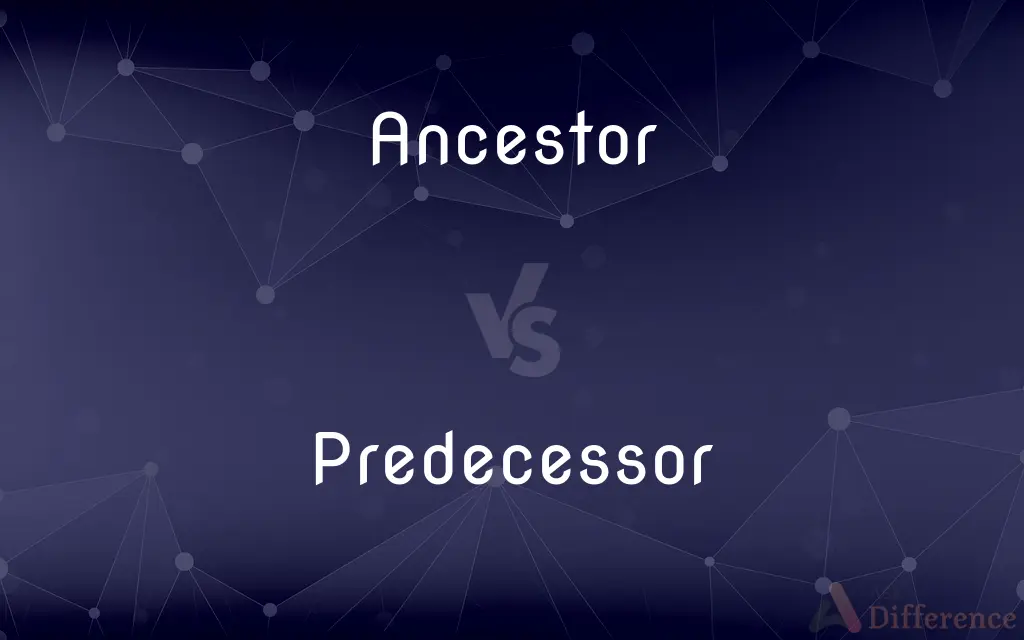Ancestor vs. Predecessor — What's the Difference?
By Fiza Rafique & Urooj Arif — Updated on March 14, 2024
An ancestor refers to a familial forebear, often from a previous generation, within biological lineage. Similar, broadly denotes an entity or person that preceded another in specific role, position, or sequence, not limited to familial relationships.

Difference Between Ancestor and Predecessor
Table of Contents
ADVERTISEMENT
Key Differences
An ancestor is specifically related to biological lineage or heritage, emphasizing the genetic and familial connections across generations. This term is deeply rooted in the context of family trees, where ancestors include parents, grandparents, great-grandparents, and so on, highlighting a direct line of descent.
A predecessor, on the other hand, is a more general term applicable in various contexts, such as jobs, positions, titles, or even inanimate objects like models of technology. It implies a preceding figure or item that held a certain position or status before the current entity. Unlike ancestors, predecessors do not imply a familial or genetic link, focusing instead on the continuity or progression within roles, titles, or sequences.
While all ancestors are predecessors in the familial lineage, not all predecessors are ancestors since the former can refer to non-familial predecessors. The concept of predecessor is widely used in professional, historical, and technological contexts, indicating a succession of entities or individuals that may or may not have personal or genetic connections.
Ancestors play a crucial role in understanding one’s heritage and biological origins, contributing to an individual's identity and familial culture. Predecessors, however, are integral to the continuity and evolution of roles, responsibilities, and innovations, marking the progression and changes over time in various fields.
The identification of ancestors is primarily a matter of genealogical or biological interest, serving to trace lineage and heritage. Identifying predecessors is often relevant in historical analysis, succession planning, and the evolution of concepts, technology, and leadership, reflecting changes and developments across different domains.
ADVERTISEMENT
Comparison Chart
Definition
A familial forebear in a biological lineage.
A preceding entity in a role, position, or sequence.
Context
Biological lineage and family history.
Professional, technological, historical contexts.
Connection
Genetic and familial.
Role-based, positional, or sequential.
Purpose
To trace familial heritage and lineage.
To understand continuity and progression in various fields.
Examples
Parents, grandparents, great-grandparents.
Former job holders, earlier models of a device, historical leaders.
Compare with Definitions
Ancestor
A person from whom one is descended, often more remote than a grandparent.
She traced her ancestor back to the 18th century through family records.
Predecessor
One who held a position or office before another.
The new CEO plans to continue the initiatives started by her predecessor.
Ancestor
The originator or precursors in a family context.
Our ancestors immigrated here over a hundred years ago, seeking a better life.
Predecessor
In a historical context, an entity or person that preceded another.
The empire's military strategies were influenced by the tactics of its predecessors.
Ancestor
Forebears or progenitors in a family's lineage.
The cultural traditions have been passed down from our ancestors for generations.
Predecessor
An earlier version of something, such as a product or technology.
The smartphone's predecessor was the feature phone, which had fewer capabilities.
Ancestor
Relating to one's family or ethnic descent.
The festival celebrates the rich heritage of our ancestors.
Predecessor
A forerunner or antecedent in a sequence or development.
The steam engine was a direct predecessor to the modern combustion engine.
Ancestor
In biology, an organism from which others have evolved.
The wolf is a common ancestor of all domestic dogs.
Predecessor
Someone or something that comes before another in a lineage or series.
This legislation was built on the foundations laid by its predecessors.
Ancestor
An ancestor, also known as a forefather, fore-elder or a forebear, is a parent or (recursively) the parent of an antecedent (i.e., a grandparent, great-grandparent, great-great-grandparent and so forth). Ancestor is "any person from whom one is descended.
Predecessor
One who precedes another in time, especially in holding an office or position.
Ancestor
A person from whom one is descended, especially if more remote than a grandparent; a forebear.
Predecessor
Something that has been succeeded by another
The new building is more spacious than its predecessor.
Ancestor
A forerunner or predecessor.
Predecessor
An ancestor; a forebear.
Ancestor
(Law) The person from whom an estate has been inherited.
Predecessor
One who precedes; one who has preceded another in any state, position, office, etc.; one whom another follows or comes after, in any office or position.
Ancestor
(Biology) The actual or hypothetical organism or stock from which later kinds evolved.
Predecessor
A model or type of machinery or device which precedes the current (or later) one. Usually used to describe an earlier, outdated model.
The steam engine was the predecessor of diesel and electric locomotives.
Ancestor
One from whom a person is descended, whether on the father's or mother's side, at any distance of time; a progenitor; a forefather.
Predecessor
(mathematics) A vertex having a directed path to another vertex
Ancestor
An earlier type; a progenitor
This fossil animal is regarded as the ancestor of the horse.
Predecessor
One who precedes; one who has preceded another in any state, position, office, etc.; one whom another follows or comes after, in any office or position.
A prince who was as watchful as his predecessor had been over the interests of the state.
Ancestor
(legal) One from whom an estate has descended;—the correlative of heir.
Predecessor
One who precedes you in time (as in holding a position or office)
Ancestor
(figuratively) One who had the same role or function in former times.
Ancestor
(linguistics) A word or phrase which serves as the origin of a term in another language.
Ancestor
(transitive) To be an ancestor of.
Ancestor
One from whom a person is descended, whether on the father's or mother's side, at any distance of time; a progenitor; a fore father.
Ancestor
An earlier type; a progenitor; as, this fossil animal is regarded as the ancestor of the horse.
Ancestor
One from whom an estate has descended; - the correlative of heir.
Ancestor
Someone from whom you are descended (but usually more remote than a grandparent)
Common Curiosities
Can a predecessor have no direct relationship with their successor?
Yes, predecessors and successors may not always have a direct personal relationship, especially in contexts like technology or positions where the succession is based on role or function rather than personal mentorship or lineage.
How is the term "predecessor" used outside of familial contexts?
"Predecessor" is widely used to refer to previous holders of positions, earlier versions of objects or technology, and antecedents in sequences or developments.
What significance do ancestors hold in cultural contexts?
Ancestors often hold significant cultural, spiritual, and historical importance, representing a connection to the past and a source of identity and heritage for many communities.
Why is it important to distinguish between ancestors and predecessors?
Distinguishing between the two helps clarify the type of relationship or succession being discussed—whether it is familial and genetic, or positional and sequential, thereby providing accuracy in communication and analysis.
How does the concept of ancestors play a role in evolutionary biology?
In evolutionary biology, ancestors refer to earlier species from which current species have evolved, highlighting the genetic lineage and evolutionary paths of organisms.
What role do predecessors play in the development of scientific theories or technologies?
Predecessors in scientific theories or technologies are foundational elements or earlier versions that have informed and paved the way for current developments, demonstrating the progression of knowledge and innovation.
Can the term "predecessor" be used for ancestors?
While "predecessor" can technically apply to ancestors in the context of familial lineage, it lacks the specific implication of genetic or familial connection that "ancestor" conveys.
Are all ancestors considered predecessors?
Yes, in the broad sense that they came before in a lineage, all ancestors can be considered predecessors, but the term "ancestor" provides a more specific familial context.
How do historians use the concepts of ancestors and predecessors?
Historians use "ancestors" to discuss familial or genealogical histories, while "predecessors" are used to understand historical successions, evolutions of ideas, technologies, and leadership roles.
In what contexts might the term "predecessor" be preferred over "ancestor"?
The term "predecessor" might be preferred in discussing historical roles, technological evolutions, and organizational histories, where the emphasis is on the continuity of roles or functions rather than familial lineage.
How do genealogists differentiate between direct and indirect ancestors?
Genealogists differentiate between direct ancestors, who are in one's immediate lineage (parents, grandparents), and indirect ancestors, such as cousins or aunts/uncles, who are related but not in the direct line of descent.
Can organizations or entities have predecessors?
Yes, organizations or entities can have predecessors, referring to earlier forms or versions of the entity, or organizations that fulfilled similar roles before the current entity's formation.
How are ancestors and predecessors relevant to the study of history and culture?
Ancestors are central to understanding familial and cultural heritage, offering insights into social, cultural, and genetic connections. Predecessors help trace the development of ideas, institutions, and technologies, providing context for historical evolution and cultural shifts.
Share Your Discovery

Previous Comparison
Bribery vs. Graft
Next Comparison
Snob vs. SnubAuthor Spotlight
Written by
Fiza RafiqueFiza Rafique is a skilled content writer at AskDifference.com, where she meticulously refines and enhances written pieces. Drawing from her vast editorial expertise, Fiza ensures clarity, accuracy, and precision in every article. Passionate about language, she continually seeks to elevate the quality of content for readers worldwide.
Co-written by
Urooj ArifUrooj is a skilled content writer at Ask Difference, known for her exceptional ability to simplify complex topics into engaging and informative content. With a passion for research and a flair for clear, concise writing, she consistently delivers articles that resonate with our diverse audience.














































